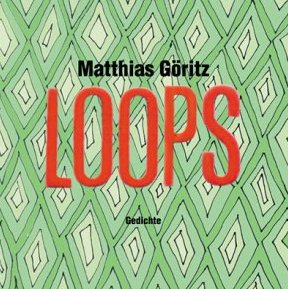Beckoning With Letters: Poems by
Matthias Göritz
by Matthias Göritz
translated by Mary Jo Bang
There is an undercurrent of strangeness in Matthias Göritz’s poems, as the forces of nature appear to malevolently toy with our fragile human perceptions. There is also a sense of narrative abridgement, which makes it necessary for the translator to take the affective measure of each word and replace the original with a word that is capable of doing all the complicated work the original did. Especially since, for all the seriousness of the poems, there is also a distinctive wry humor; the two moods have to be maintained throughout each poem. In poems this intimate, and this astute, it’s essential that the reader not be distracted by the fact that the poem was written in another language.
I have tried to create the sense of a speaker who has a consistent voice throughout the poems and who speaks this new language, English, as if he were born to it, imbuing it with the same fluency and equal knowledge of craft as the original speaker manifested in German. I tried to match, word for word, this poet’s sly humor, his keen insight, and his artistry as I carried over the contemporary German and the embedded polyphonic echoes of English, Russian, and French into an equally contemporary American English.
–Mary Jo Bang
See Original Language See Translation
Third Crow
I.
Nights.
My legs are empty blanks.
To write about fencing,
and only cover swordplay,
via placating dripped-out baby-steps,
with lightning strikes, is like sleep,
that never stops by.
Here they hang. Hands,
like out of bathtubs
and windows. Beckoning with letters.
My legs define the district’s limits:
A brimming display case, at the corners, the calico
fringes with their windows, houses, and homes.
Who if not I was living inside?
In there going to pieces:
Everything imaginable: night,
shadows and bogus locked castles.
A brain-race-dead-heat—dream state.
I pull the hem up over me,
this canopy of twenty sleeping sheep,
I sense the gray dread, the dawn, like ice-flowers on frost
bursting into light-based faces and it comes home—
I go
with step-wise progression, to the window,
and decisively slip out
II.
We’re tangling here
with the heart,
ears listening in
and watching,
as the day
builds itself up from dust motes;
and one, as one
becomes longer,
shadows, on a tree, that breaks off in a wall.
I Went Out of My Mind
The door has shaken up the house
with me inside it
The sun is shining
A bit much for morning
Afternoon—barely any difference
The house is shaking itself up
the sun
with me inside it
I am
a more unstable border
Horizon
of a world created from last gasps
The day carries them with it
Again and again I feel my tongue in my mouth
The day
The room
The sun
The door
Bonkers
I think to myself
and me inside it
Metronome
Pretend: you’ve lost your ear!
That faint tapping of the world, that you hear,
it’s rain sinking into the barometer’s silence.
Years pass. That means: one is preoccupied
with something. Time, rhythmic beat, tact as
keeping time. One considers the stars. If you spit
into it do you sense this: the icy winter dawning.
Shoes in the windows before the shop’s opening.
Naked lies the light above the shopping mall.
You can sense grass nearby. It’s there to hear more
of the world’s faint tapping. Rain against glass.
One step before your door
Dritte Krähe
I
Nachts.
Meine Beine sind leer.
Über das Fechten zu schreiben,
und nur über das Fechten,
mit stillen Schritten,
mit Blitzen, ist wie Schlaf,
der nicht kommt.
Hier hängen sie. Hände,
wie aus Badewannen
und Fenstern. Winken mit Briefen.
Meine Beine beschreiben das Viertel:
Vitrinen voll, um die Ecken, die bunten Enden
mit ihren Fenstern, die Häuser, und Häuser.
Wer wenn nicht ich lebte darin?
Da drinnen wird aufgelöst:
Alles was denkbar ist: Nacht,
die Schatten und falschen Schlösser.
Ein Hirnrennen – Traum.
Ich spanne ihn über mir,
diesen Schirm der zwanzig schlafenden Schafe,
ich fühle das Graun, das Morgengraun, das wie Eisblumen
in den Lichtgesichtern zerplatzt und zuhause ist –
ich geh
wie auf Treppenstufen, ans Fenster,
und rutsche mit Sicherheit
II
Wir legen uns an
mit dem Herzen,
horchen
und sehn,
wie der Tag
sich selbst aus dem Staub macht;
und man, wie man
länger wird,
Schatten, an einem Baum, der abbricht an einer Mauer.
Ich bin aus dem Kopf gegangen
Die Tür hat das Haus bewegt
und mich darin mit
Die Sonne scheint
Ein Stück weit ist Vormittag
Nachmittag – kaum unterscheidbar
Das Haus bewegt sich
die Sonne
und mich darin mit
Sie scheint
die Erde entlang
Ich bin
ein haltloser Rand
Horizont
in einer aus Atemzügen erschaffenen Welt
Der Tag nimmt sie mit
Immer wieder betaste ich meine Zunge im Mund
Der Tag
Das Zimmer
Die Sonne
Die Tür
Verrückt
denke ich mir
und mich darin mit
Metronom
Stell dir vor: Dein Ohr ist nicht da!
Das schmale Klopfen der Welt, das du hörst,
Regen versinkt im Schweigen der Barometer.
Die Jahre vergehn. Das heißt: man ist
mit etwas befaßt. Zeit, Rhythmus, Takt.
Man sieht in die Sterne. Wenn du hineinspuckst
kannst du ihn fühlen: den kühlen Wintermorgen.
Die Scheiben der Schuhgeschäfte vorm Öffnen.
Nackt liegt das Licht über der Einkaufszone.
Du spürst Gras. Es ist zu hören das
schmale Klopfen der Welt. Regen auf Glas.
Vor deiner Haustür
The German originals of these poems were published in LOOPS: Gedichte, published in 2001 by Literaturverlag Droschl (Graz, Austria).
Published on April 30, 2020

